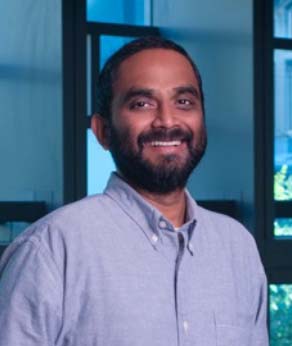Science and Mathematics
Soft Matter Seminar. Engineering mechano-intelligence: How forces transmitted from a cell’s environment affect DNA organization
October 15, 2021 at 11:00am – 12:00pm EDT
Physics Building, 202 and Virtual (See event details)
This event has already occurred. The information may no longer be valid.

Vivek Shenoy
Center for Engineering Mechanobiology and School of Engineering and Applied Sciences, University of Pennsylvania
Abstract: Microscale changes in tissue environment are translated to changes in cell behavior and phenotype, yet the mechanisms behind how these phenotypic changes occur are poorly understood. Here, we describe and model chromatin, which stores genetic information within the cell nucleus, as a dynamic nanomaterial whose configuration is modulated by chemo-mechanical cues in the microenvironment. Our findings indicate that physiologic chemo-mechanical cues can directly regulate chromatin architecture in progenitor cell populations. Through direct experimental observation and modeling that incorporates phase transitions and histone methylation kinetics, we demonstrate that soft environmental cues drive chromatin relocalization to the nuclear boundary (leading to the formation of Lamin-Associated Domains or LADs) and compaction. Conversely, dynamic stiffening attenuates these changes. We show how methylation and acetylation impact the spatial distribution of the stiffness of the nucleus. Interestingly, in diseased human fibrous tissue cells, this link between mechanical inputs and chromatin nano-scale remodeling is abrogated. These data indicate that chromatin dynamics and plasticity may be hallmarks of disease progression and targets for therapeutic intervention.
Biography: Vivek Shenoy is the Eduardo D. Glandt President’s Distinguished Professor in the School of Engineering and Applied Sciences at the University of Pennsylvania. Dr. Shenoy’s research focuses on developing theoretical concepts and numerical methods to understand the basic principles that control the behavior of both engineering and biological systems. He has used rigorous analytical methods and multiscale modeling techniques, ranging from atomistic density functional theory to continuum methods, to gain physical insight into a myriad of problems in biomechanics and biomaterials. He is the principal investigator and director of the NSF-funded Science and Technology Center for Engineering Mechanobiology established in 2016 and the NCI-funded Metastasis Research Network center funded in 2021.
The seminar will be hybrid. Please contact Minh-Tri Ho Thanh for information about joining virtually.
This event was published on October 5, 2021.
Event Details
- Category
- Science and Mathematics
- Region
- Hybrid Campus and Virtual
- Open to
- Campus Community
- Contact
- Minh-Tri Ho Thanh
mhothanh@syr.edu
- Accessibility
- Contact Minh-Tri Ho Thanh to request accommodations
